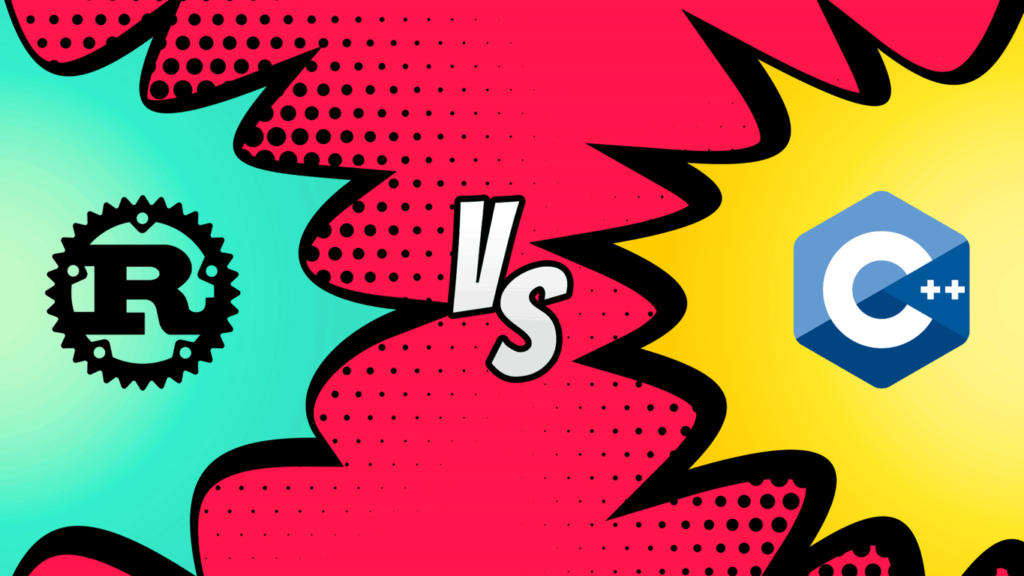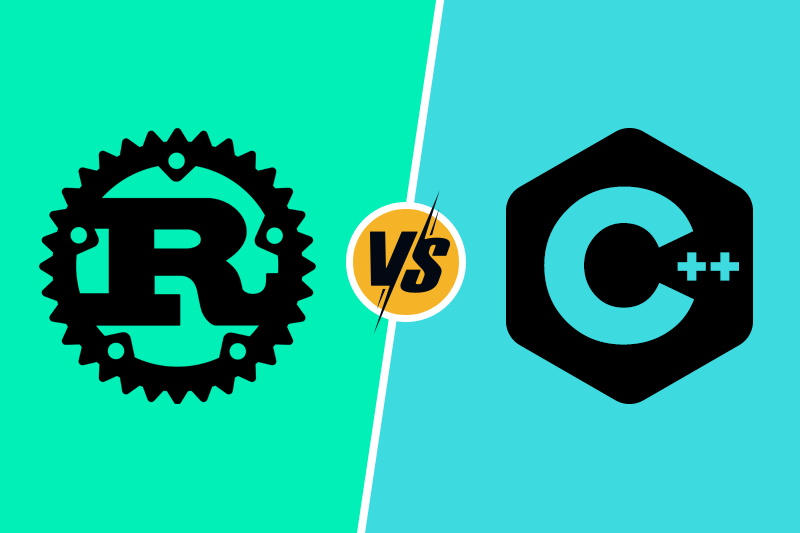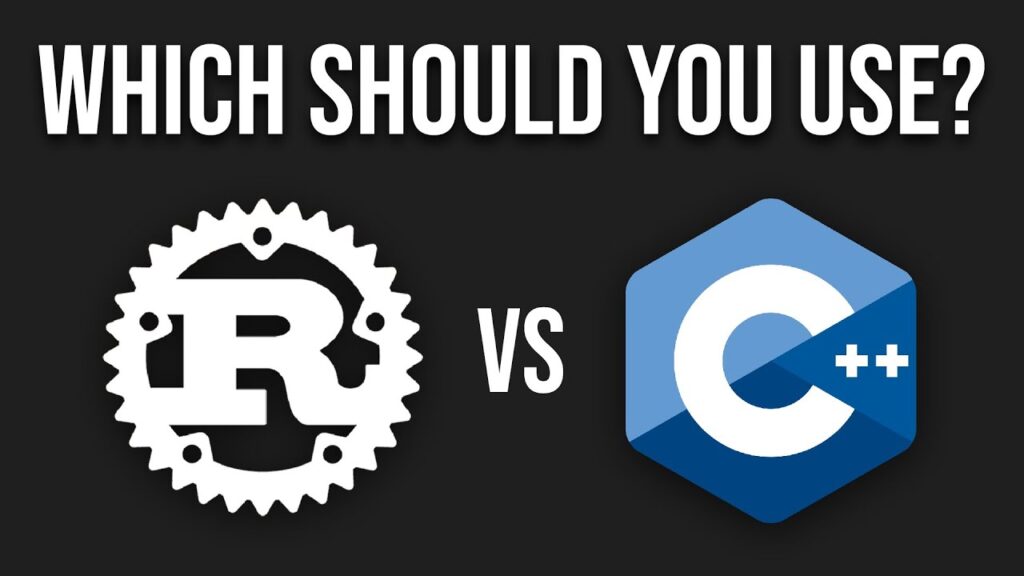Choosing between Rust and C++ depends on your specific goals and background. If you prioritize safety, stability, and a modern development experience, Rust might be a better choice. Its ownership system and borrow checker make it a safer language, and its modern tooling simplifies development.
On the other hand, if you need maximum performance, and low-level control, and are working with large existing codebases, it might be more suitable. Consider your project requirements and your familiarity with complex languages and memory management. Evaluate the specific features each language offers to make an informed decision.
Both Rust and C++ have their strengths, so it ultimately depends on your preferences and the demands of your projects.
What is Rust?
Rust is a programming language that originated from Mozilla in 2010. It prioritizes safety and performance, with a particular emphasis on secure concurrency. While sharing similarities with C++, Rust stands out by offering memory safety without relying on garbage collection. Its primary goals include achieving superior performance and enhanced safety compared to C++
What is C++?

C++ is an object-oriented programming language created by Bjarne Stroustrup in 1985. It is an extension of the C programming language, often called “C with Classes.”
Further, known for its strong performance and extensive library of methods, it offers improved concepts. The Standard Template Library (STL) enables the development of high-speed applications.
Common Uses of Rust and C++
Rust and C++ are both powerful programming languages used in various domains, each with its own strengths and common uses.
Rust
- Systems programming: Rust’s memory safety and concurrency features make it well-suited for low-level tasks like operating systems, embedded systems, and network drivers.
- Web development: Frameworks like Actix and Rocket offer fast and secure web development experiences with Rust’s memory-safe guarantees.
- Data science and high-performance computing: Its performance rivals C++ and offers powerful libraries for data analysis and scientific computing.
- Blockchain and cryptography: its security guarantees and deterministic behavior make it a popular choice for blockchain projects and secure cryptocurrency libraries.
- Game development: Major game engines like Unity and Unreal Engine are integrating Rust, particularly for backend systems and critical gameplay components.
C++
- High-performance applications: It offers fine-grained control and direct hardware access, making it ideal for performance-critical tasks like game engines, simulations, and real-time applications.
- Legacy codebases: It has been around for decades and is the backbone of many large-scale systems like financial software, medical devices, and industrial automation.
- Large libraries and frameworks: It boasts a vast ecosystem of mature libraries and frameworks for various domains, including computer graphics, scientific computing, machine learning, and more.
- High-performance computing and scientific simulations: It remains a dominant language in these fields due to its control over memory and efficient execution.
- Game development: C++ is still widely used for core gameplay logic and performance-sensitive parts.
Problems Solved by Rust that C++ Doesn’t Address
Rust excels in domains where C++ faces challenges, notably in Augmented Reality, Virtual Reality, IoT applications, and hardware programming. It outperforms C++ in embedded or device-based development, proving particularly effective for low-level software tasks like system utilities, operating system kernels, and microcontroller drivers.
Myths Associated with C++ and Rust
Contrary to a myth, C++ arithmetic is not inherently safer than Rust.
Rust’s advantages extend beyond object lifetime analysis; it offers a comprehensive approach to safety. The belief that C++ is faster than Rust is a misconception.
Rust’s safety measures have been proven effective and are a significant asset. It is capable of aiding with C libraries contrary to a common myth.
Switching Between Rust and C++
The CXX library simplifies the seamless transition between Rust and C++. It facilitates the invocation of C++ code from Rust and vice versa safely and efficiently.
Before the advent of the CXX library, integrating Rust with C++ was challenging, requiring manual crafting of Rust-C and C-C++ interfaces. The CXX library streamlines this process, offering a more convenient and effective approach to Rust-C++ integration.
What Is The Strengths Of Rust?
Rust is a modern systems programming language designed with a focus on safety, concurrency, and performance. Some of its key strengths include:
Memory Safety
Rust’s ownership and borrowing system guarantees memory safety by preventing issues like memory leaks and dangling pointers. This enhances code reliability and maintainability, making Rust a suitable choice for systems where memory safety is critical.
Concurrency
It offers built-in features for safe multithreading, allowing developers to write concurrent programs without data races or race conditions. This is crucial for developing high-performance applications and responsive systems that utilize parallelism effectively.
Modern Syntax & Tooling
Rust provides a clean and concise syntax and modern tooling like Cargo (package manager) and Clippy (static code linter). These tools facilitate faster and more enjoyable development by streamlining package management and providing helpful suggestions for improving code quality.
Performance
Despite its focus on safety, Rust achieves excellent performance with minimal overhead. This makes Rust suitable for a wide range of applications, including web servers and embedded systems, where performance is a crucial factor.
Growing Community
It may be younger than C++ but boasts a vibrant and rapidly growing community. This community ensures ongoing support and fosters the continuous development of new libraries and frameworks, further enriching the Rust ecosystem.
What Is The Strengths Of C++?
C++ has several strengths that make it a popular choice for software development, especially for performance-critical and resource-constrained applications. Some of the key strengths of C++ include.
Ultimate Control & Flexibility
C++ provides fine-grained control over memory management and hardware, allowing developers to optimize code for performance-critical scenarios.
Developers have unparalleled control over low-level details, making it suitable for tasks demanding precise resource manipulation.
Mature Ecosystem & Libraries
It boasts an extensive ecosystem of libraries and frameworks covering various domains such as graphics, machine learning, scientific computing, and network programming. This vast ecosystem accelerates development by offering solutions to common problems and reducing the need to reinvent the wheel.
Legacy Codebase Expertise
C++ is deeply entrenched in scientific, industrial, and financial sectors, serving as the backbone of many existing systems. Learning it opens avenues for contributing to and maintaining critical systems, leveraging expertise in a language foundational to key applications.
High-Performance Potential
With skilled developers optimizing code, C++ has the potential to achieve unparalleled performance compared to other general-purpose languages.
This attribute makes it an ideal choice for pushing the boundaries of computational power in various applications.
Industry Adoption
It remains dominant in industries such as games, simulations, and high-performance computing (HPC). Learning it provides access to career opportunities in sectors where the language is widely adopted and continues to play a pivotal role.
What Is The Weaknesses Of Rust & C++?

While Rust and C++ are powerful languages with various strengths, they also have their weaknesses.
Rust
Its ownership and borrowing system guarantees memory safety, eliminating entire categories of potential errors like memory leaks and dangling pointers. This leads to more reliable and maintainable code.
Moreover, it has built-in features for safe and efficient multithreading, making it easier to write concurrent code without data races or race conditions. This is essential for high-performance applications and responsive systems.
Rust offers a clean and concise syntax with excellent compiler error messages and a plethora of modern tooling like Cargo (package manager) and Clippy (static code linter). Moreover, this makes development faster and more enjoyable.
Although not quite as raw as C++, it delivers excellent performance with minimal overhead for its safety features. Furter, this makes it suitable for a wide range of applications, from web servers to embedded systems.
While still younger than C++, Rust has a vibrant and rapidly growing community, producing new libraries and frameworks at an impressive pace. This ensures continued support and resources for years to come.
C++
It gives you fine-grained control over memory management, hardware access, and low-level details. This allows for highly optimized code and precise manipulation of resources, ideal for performance-critical tasks.
C++ has a vast and established ecosystem of libraries and frameworks for virtually any domain, from graphics and machine learning to scientific computing and network programming. This saves development time and provides readily available solutions to common problems.
Further, it is the backbone of many existing systems, particularly in the scientific, industrial, and financial sectors. Learning C++ opens doors to contributing to and maintaining these crucial systems.
When optimized and wielded by experienced developers, it can achieve the highest performance levels of any general-purpose language. This makes it ideal for pushing the boundaries of computational power.
It remains a dominant language in several industries like games, simulations, and high-performance computing. Learning C++ gives you access to these industries and their career opportunities.
FAQ’s
Is it worth it to learn Rust or C++?
Yes, Learning Rust is often recommended over C++ for several reasons. Rust is considered better in many aspects and teaches proper coding practices. While C++ has extensive community support and large libraries, Rust is admired for its safety, efficiency, and modern features, making it a valuable language to learn.
Should I learn Rust or C++ in 2023?
Yes, In 2023, Rust is favored as a modern language and was voted the most admired programming language in the Stack Overflow Developer Survey. It is regularly chosen over C++ for its safety and efficiency, making it a compelling choice for developers.
Is C++ being replaced by Rust?
Actually, Rust is going to replace C++ over time, as C++ remains widely used, especially in systems programming. While Rust offers advantages in terms of safety and efficiency, C++ codebases are still prevalent, and C++ remains a preferred language in various industries.
Is Rust better than C++ for game development?
Yes, Rust offers advantages for game development, providing speed, memory safety without a garbage collector, and ease of learning. While C++ and other languages are suitable for game creation, Rust’s features make it a compelling option, especially for beginners in game development.
Is Rust basically C++?
Yes, Rust’s syntax is similar to C++, but it distinguishes itself by offering faster speed and memory safety without a garbage collector. Originally developed for Mozilla Firefox, Rust has gained popularity among C++ developers, particularly in game development, showcasing its efficiency and advantages over C++.
Final Words
Choosing between Rust and C++ depends on what you need. If you want a safer and more modern experience with good community support, go for Rust. If you’re looking for maximum performance and have experience with complex languages, C++ might be a better fit.
In addition, consider your project’s demands and your comfort level with language intricacies when making your decision. Both Rust and C++ have their strengths, so choose based on what aligns with your goals and preferences.
